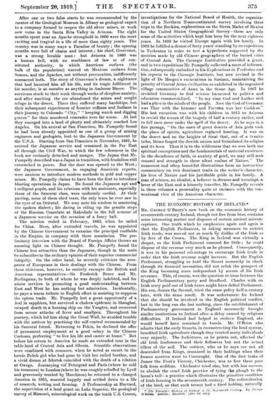THE ECONOMIC HISTORY OF IRELAND.*
Mn. GEORGE O'BRIEN'S new book on the economic history of seventeenth-century Ireland, though not free from bias, contains some interesting matter and disposes of certain ancient miscon- ceptions. One truth which he emphasizes again and again is that the English Parliament, in taking measures to restrict Irish trade, was moved not so much r.iy dislike of the Irish as by fear of the Crown. The King in Ireland was virtually a despot, as the Irish Parliament counted for little ; he could dispose of the revenue very much as he pleased. Consequently,' it was to his personal advantage to encourage Irish trade in order that the Irish revenue might increase. But the English Parliament, struggling to hold the Stuart monarchy in check through its financial necessities, did not relish the prospect of the King becoming more independent by means of his Trish revenues. This, of course, was the question at issue between the English Parliamentary party and Strafford. Charles with an Irish army paid out of Irish taxes might have defied Parliament.' His son, James the Second, tried the same policy half-a-century later, with the same result. It was unfortunate for Ireland that she should be involved in the English political conflict,' but in the long run she lost nothing,. since the establishment of Parliamentary government in England necessarily brought similar institutions to Ireland after a delay caused by religious difficulties. If Ireland had helped to enslave England, she would herself have remained in bonds. Mr. O'Brien also admits that the early Stuarts, in reconstructing the land system, benefited Irish agriculture though they treated many individuals very unjustly. The forfeitures, as he points out, affected the1 old Irish landowners and their followers but not the actual tillers of the soil. The cottiers, who as he says are not all descended from Kings, remained in their holdings when their former masters went to Connaught. One of the first tasks of James the First's Viceroy, Chichester, was to free these poor folk from serfdom. Chichester tried also, but with less success, to abolish the cruel Irish practice of tying the plough to the horse's tail—a practice which illustrates the primitive condition of Irish farming in the seventeenth century. The redistribution of the land, so that each tenant had a fixed holding, naturally • The Economic Hiatory of Ireland in the Seventeenth Century. By George
O'Blien, Lublin: liaunrel. 110s. Cd. net.,1 brought about a better yield. The gradual abolition of " creaght- ing "—that is, driving herds of cattle about the country from one pasture to another as the nomads of Central Asia or Arabia do to this day—was another English reform. Mr. O'Brien is inclined to regard the reigns of James H. and Charles I. up to 1641 as a halcyon period, despite the Ulster and Munster plantations.
The Roman Catholic rebellion of 1641 threw Ireland back into chaos. Mr. O'Brien does not discuss its political aspects.
Here we need only say that the Irish Roman Catholics chose the most inappropriate moment for their revolt ; the furious anger aroused in England and Scotland by the news of the massacres of Protestants in Ireland did infinite harm to the King's cause at a time when he seemed to be regaining popularity. The long years of civil war undid all the good that Chichester and
Strafford had done. The Cromwellian settlement, far more drastic than that of James or that of Elizabeth, expropriated nearly all the Roman Catholic landowners. The nascent indus- tries were crushed and had to start anew at the Restoration. It is well to note this in connexion with the woollen industry.
No modern economist would defend the deliberate suppression of Ireland's export trade in woollen goods at the close of the
seventeenth century. But the actual extent of the injury in- flicted on Ireland has been exaggerated. Mr. O'Brien, though he is an Anglophobe, points out that, when the embargo was imposed, Ireland imported more woollen goods than she exported. Indeed, the industry could not have assumed large proportions between 1660 and 1700, if we consider that the violent civil war between James II. and William III. had worked great harm toward the close of that period. It may be added that many of the woollen workers were English or foreign Protestant immigrants. As Mr. O'Brien says, if the Irish land system had been more generous, Ireland would not have lamented the loss of the export trade in woollens. The rapid growth of the linen trade, especially in Ulster, did not wholly compensate for the decline of the kindred industry. It is rather curious to find Mr. O'Brien controverting the accepted belief about the Ulster linen trade. Linen, of course, was made in Ireland long before the Revolution. But the industry in its modern form, as he him- self shows, was developed chiefly in Ulster in the later seven- teenth century, whereas a linen factory set up near Dublin, with the patronage of the Duke of Ormonde and a State subsidy, failed as most Irish manufacturing industries have failed outside Ulster.
Mr. O'Brien says much in praise of the " Patriot Parliament " called by James. IL when, after his abdication and flight to France, he had landed in Ireland with a French army. Doubt- less that Roman Catholic assembly would have tried to benefit Irish trade and agriculture. But Mr. O'Brien forgets to mention that it made itself impossible by proposing to expropriate and attaint over two thousand Protestant landowners, and that its ruling spirit Tyroonnel, " lying' Dick Talbot," was prepared to recognize a French protectorate over Ireland. Obviously, Pro- testant England could not compromise with such " patriots," any more than she can compromise now with Sinn Fein. William III. was engaged in a desperate struggle with Louis XIV., who sought to dominate Europe, and Ireland was a pawn in the game. The economic history of Ireland, either at that or at any other period, cannot be understood without reference to British and European politics, and it is a real misfortune for Ireland that her native historians are so reluctant to take broader views. Mr. O'Brien does good service in exposing the futility of the mercantilist theory of economies which led our seventeenth- century ancestors astray. Thus the closing of the English ports in 1663 to Irish fat cattle and, later, to Irish meat, at the instance of the English graziers, did no harm to Ireland but injured English merchants and manufacturers. The Irish began to export meat, hides and so forth to the Continent, where they competed with our own exporters ; moreover, they bought their manu- factured goods abroad instead of England. The English ships plying to Ireland lost most of their freights. It is an instructive example of the folly of Protection carried to an extreme. But it is necessary to add that such economic theories, long ago dis- credited in Great Britain, are far from being dead in Ireland. Many Irish Nationalists would adduce the action of Charles IL's Parliament as a reason for claiming Home Rule now, partly because they live in the past and partly because they still believe in high tariffs as a means of making Ireland entirely independent. Mr. O'Brien's facts, rightly under- stood, point to the absurdity of ever again separating the
economic interests of Great Britain and Ireland. But his book will doubtless be used to further the Irish agitation for a tariff directed mainly against this country.







































 Previous page
Previous page